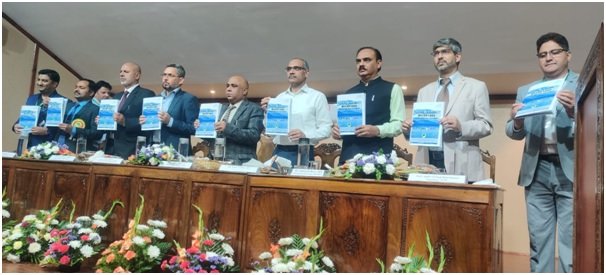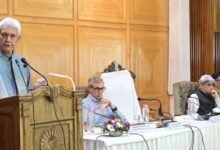World Environment Day marked with unified call to “End Plastic Pollution” Flagship event by DEERS at Islamic University S&T spotlights Mission LiFE, plastic-free forests, youth-led solutions

AWANTIPORA, JUNE 5: The Department of Ecology, Environment & Remote Sensing (DEERS) today joined hands with the Islamic University of Science and Technology (IUST) to mark World Environment Day 2025 with a high-energy programme in the Awantipora campus that echoed the United Nations theme “Ending Plastic Pollution.”
More than four hundred participants including senior forest officials, faculty members, researchers, students, NGOs and representatives of line departments, pledged to translate that slogan into an action agenda for Jammu & Kashmir.
Presiding over the ceremony, Principal Chief Conservator of Forests (PCCF) and Head of Forest Force, Suresh Kumar Gupta, reminded the gathering that only a decisive change in individual behaviour can match the scale of the plastic crisis.
Citing the Forest Department’s “Plastic-Free J&K” campaign and the wider Mission LiFE movement, he described how inter-departmental clean-up drives are already removing tonnes of single-use plastics from the forest, wildlife and eco-sensitive zones. “Every bag we refuse and every bottle we reuse pushes us closer to a carbon-neutral, litter-free Jammu & Kashmir,” he said, urging the young people in particular to become “champions of responsible consumption.”
Sarvesh Rai, Chief Wildlife Warden, picked up the biodiversity thread, noting encouraging signs that populations of flagship species are stabilizing inside the protected areas. He appealed to the students, residents and the tourism sector to adopt local water bodies and conduct regular clean-ups to keep them plastic free.
Echoing those sentiments, Vasu Yadav, Chairman J&K Pollution Control Committee, acknowledged that plastic “has made modern life affordable” and is unlikely to disappear overnight. “The real breakthrough,” he emphasized, “lies in strict source segregation of waste so that plastic can either be recycled or safely co-processed rather than dumped in our rivers.”
Managing Director of the J&K Forest Development Corporation, Suneesh Buxy, offered a success story from Bhopal ranked as one of India’s cleanest cities after sustained community action and called on Srinagar and Jammu to replicate that model. “Youth energy, once channeled through smart policy and civic pride, can transform our urban rankings just as quickly,” he said, emphasising the health risks of micro-plastics entering the food chain.
Representing the host institution, Professor A. H. Moon, Dean of Academic Affairs at IUST, outlined the university’s own sustainability roadmap, which includes a 50-megawatt solar park and a campus-wide ban on single-use plastics. A university, he said, must function as a “living laboratory for sustainable lifestyles,” integrating the environmental themes across teaching, research and daily operations.
Registrar Dr Makdoomi affirmed that view, adding that the campus green initiative has already reduced the plastic waste by declaring the camps as plastic free zones.
The PCCF/HoFF formally released three scientific reports prepared by DEERS “Geospatial Monitoring of Wular Lake” and “Site-Suitability Analysis for Rainwater Harvesting Structures in Srinagar and Bandipora”. A short documentary on plastic pollution in J&K was also released on the occasion.
During the event awards were also presented to the winners of various contests conducted by the Department of Ecology Environment and Remote Sensing.
A spirited skit by the IUST drama club brought home the day’s message, dramatizing the journey of a plastic bottle from shop counter to riverbank and finally into our bodies.





